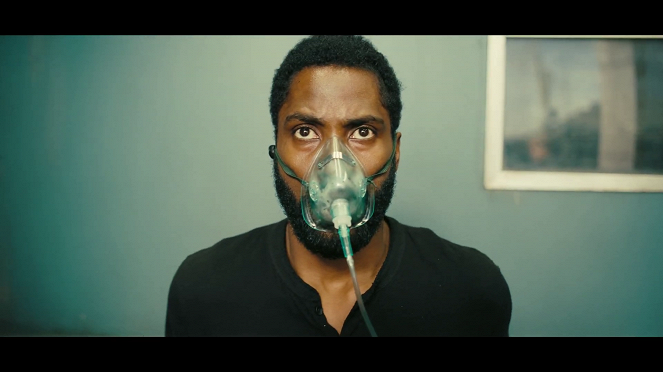Directed by:
Christopher NolanScreenplay:
Christopher NolanCinematography:
Hoyte van HoytemaComposer:
Ludwig GöranssonCast:
John David Washington, Robert Pattinson, Elizabeth Debicki, Kenneth Branagh, Aaron Taylor-Johnson, Michael Caine, Clémence Poésy, Dimple Kapadia (more)VOD (4)
Plots(1)
Fighting for the survival of the entire world, the Protagonist journeys through a twilight world of international espionage on a mission that will unfold in something beyond real-time. (Warner Bros. Home Entertainment)
Videos (5)
Reviews (21)
Nolan spins the threads of time, reverses entropy, and becomes definitively his own genre benchmark, no longer needing to prove anything to anyone. He plays a stimulating game with the viewer that is, at its core, justifiably simple because its magic lies in its precise narrative composition, which inevitably demands full attention and multiple viewings. I gave up the first time and the composition of the timelines together with the thunderous music threw me into lethargy. It was only on the second viewing that I enjoyed the elaborately complex structure that makes you think and gives nothing away for free. It’s a fascinating and immersive experience in every way, with such unique production values that it is almost impossible to compare it to anything else. I read the Q&A breakdowns for this film and consider them proof that the viewer is really just a small cog in the great game of one principle.
()
Tenet certainly doesn't pose an intellectual challenge and is one of those films that you'll enjoy the most when you think less about time paradoxes, the motives of the film's characters, and their quest to defeat the Bond-like villain. As a popcorn flick deliberately reminiscent of Agent 007 stories in a sci-fi coat, and as an action spectacle, Nolan's film really works. Thanks to John David Washington, we essentially have the first "non-white" Bond in history. I enjoyed the dynamic opening opera heist, where Nolan drew inspiration from a real terrorist act. Kenneth Branagh also pleased me, intentionally building his villain as a monstrous comic book character. Overall impression: 65%.
()
What happened (didn't happen). The opening plays with the idea of Lipsky´s Happy End, Moffat´s saga about River Song, the third Harry Potter movie and the The Sensational Reverse Brothers. Yes, it is undeniably closest to “the palindromic Inception", but with a differently conceived disruption of reality and time. From filmmaking perspective, it is again an extremely well-worked-out blockbuster “with people in suits in the same way as in a Bond movie", which at the same time does not let the brain idle. And it's purely Nolan: cold, reserved, depersonalized, sophisticated, precise and almost procedural. Which, although not many see it, is not a disadvantage this time, but an advantage. Compared to Inception, the biggest difference, apart from the surprisingly frequent and scaled-up ideas of breathtaking action based on practical effects and stunts, is that it does not give the viewer any explanation. Where Inception gradually went over the rules and clarified them, Tenet recklessly jumps right into them (especially in the final third). However, the source of “mindfucking" is not so much in the incomprehensibility/abstraction of that concept, but rather in keeping track of all of the events. And that at the end, at such a furious pace (the sophisticated audiovisual excuses helping the viewer slowly disappear), there are so many levels and storylines that it overwhelms all senses and does not change the overall level of comprehensibility at all. PS: Nolan simply has to adapt Sweterlitsch's “The Gone World" and no one can change my mind about that.
()
A banal plot in which two characters (a man and a woman with chemistry) speak normally and everyone else in such coded language that it could be developed without conspicuous illogic into a seemingly ultra-sophisticated spectacle packed with unexpected situations and unprecedented visual attractions. Or rather, one unprecedented attraction, when in one shot some characters run forward and others backwards and it looks neither ridiculous nor strange, but on the contrary, fresh and spectacular. Nolan clearly and meaningfully declared his fetish for time paradoxes in Inception and now he’s merely changing it up on other theoretical levels and interweaving it with new sub-genre elements (in this case, Bond films). And he increasingly equivocates, pretends and artificially complicates things as much as possible in order to push everything farther and higher than last time, while cleverly hiding the absence of a supporting foundation for the plot (which was dreams in Inception). Winking at the thoughtful viewer with lines like "You have no idea what I'm talking about...” Answer: “No, but it sounds extremely important" can thus be understood as passing the buck, but I see it rather as a plea for leniency towards the deliberate gaps in logic and, conversely, appreciation of his courage and exceptional genre progressiveness. Tenet is a techno-thriller from another dimension. In the context of the viewer’s state of mind induced by the film, the last scene with Pattinson reminded me of Casper Van Dien in Starship Troopers, which almost made me laugh in places with its cheesy absurdity. Actually, that was the best thing that could have happened to me with Tenet, if I'm supposed to like it. P.S. Göransson’s music is outstanding, as it gives the film a more energetic and innovative tone than we would expect from Zimmer (whose music, however, would be more enjoyable to listen to on its own).
()
This time Christopher Nolan got a little off the rails and became his own enemy. Tenet is of course a great piece, very fast paced and nice to watch, but unfortunately it disappoints in the very things that should elevate it above the classic summer blockbuster. Nolan may have announced that he's pretty much making his own Bond movie, and it looks like it for the first half, but it's more or less a classically conceived spy thriller clashing with his cool direction, where he keeps his distance from everything. And the audience has to go with him. Tenet then becomes a downright Nolan flick somewhere around the halfway point, but unlike Inception, which is the closest the film comes to it, here we don't discover the rules of the new world gradually, and no one explains them in breathtaking scenes. Nolan simply takes the characters and the audience and throws them into deep water, regardless of whether they can swim. What's going on? How does it work? What affects what? And who's to blame for it all? That's more or less dealt with on the fly here, and I reckon I missed half the stuff. I did end up enjoying a lot of the spectacular action, where things were a bit weird, but I didn't really care why. I reckon on a second viewing I would have been clear on it, kept track of everything and got everything in order. But for perhaps the first time ever with Nolan, I'm not sure I want to watch it a second time.
()



Ads